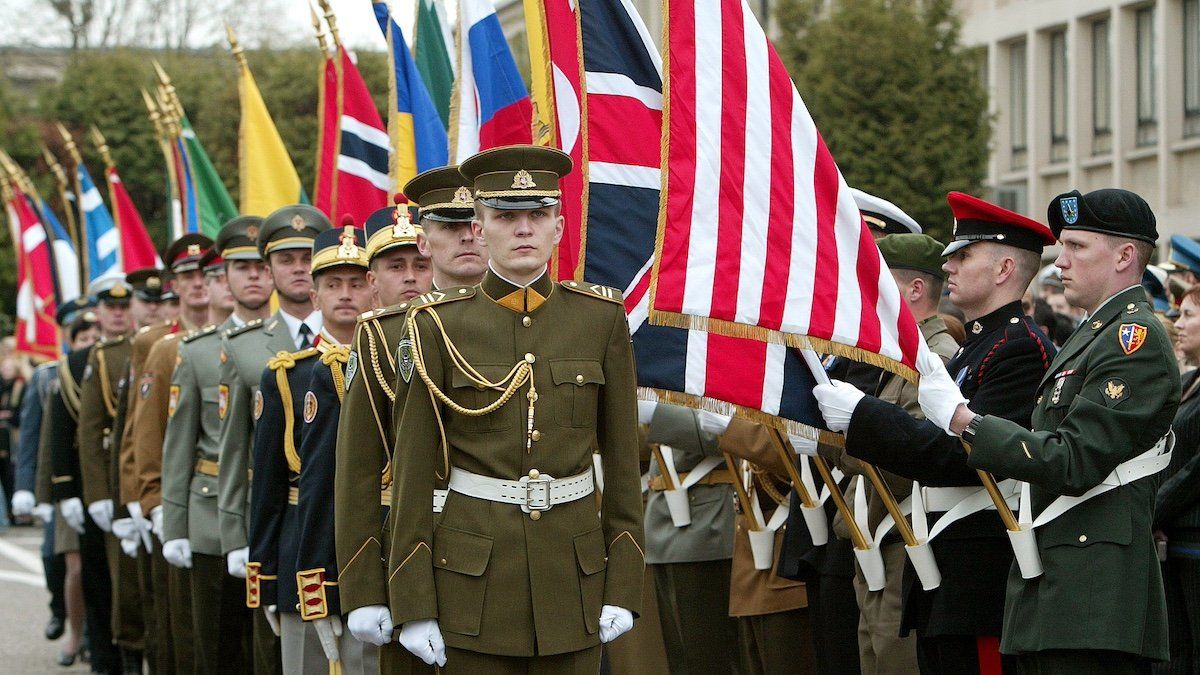Seventy-five years ago today, 12 leaders from the US, Canada, and Western Europe signed the North Atlantic Treaty, creating the world’s most powerful military alliance: NATO
Where it’s been: As World War II drew to a close in 1945, Europe faced the overwhelming challenge of reconstruction. Over 11 million displaced people were wandering the bombed-out cities and scorched countryside, including hundreds of thousands of war orphans. And on the east bank of the Elbe River stood the massive, battle-hardened Soviet Red Army, a worrying prospect as the USSR came increasingly into conflict with its erstwhile allies.
Just 18 months later, Britain and France signed the Treaty of Dunkirk, pledging mutual defense as world powers rapidly coalesced into ideological blocs. Following a Soviet-backed communist coup in Czechoslovakia, Belgium, Luxembourg, and the Netherlands joined to create the Western Union in March 1948, but within months, the Soviet blockade of West Berlin would make clear only US involvement could deter Moscow.
Belgium, Canada, Denmark, France, Iceland, Italy, Luxembourg, the Netherlands, Norway, Portugal, the United Kingdom, and the United States signed the North Atlantic Treaty just over a year hence, binding one another to mutual defense.
Five months later, the USSR tested its first nuclear bomb.
Identity crisis: Through the Cold War, NATO had a clear mission to deter the Soviet Bloc. But as the Warsaw Pact and then the Soviet Union itself collapsed in 1991, what would become of the alliance?
Instead of guarding against Eastern Europe, NATO began absorbing former Soviet bloc countries and protecting the liberal democratic order more generally. In March 1999, the alliance welcomed Poland, the Czech Republic, and Hungary — and initiated a bombing campaign that ended the Serbian invasion of Kosovo.
Then, in 2001, the alliance’s mutual defense clause was invoked for the first time in response to the Sept. 11 terrorist attacks in the US, leading to the multilateral International Security Assistance Force in Afghanistan. By 2004, another seven former Soviet and Warsaw Pact countries had joined.
But Moscow’s sudden invasion of Georgia in 2008, just months after the small Caucasian nation voted overwhelmingly to start NATO accession talks, raised the specter of a renewed Cold War. Russia’s annexation of Crimea and invasion of eastern Ukraine in 2014 restored focus on the old enemy.
Future peril. Today, NATO has expanded to 32 countries with over 3.3 million active troops, 1 million armored vehicles, 20,000 aircraft, and 2,100 warships, all backed by the US, French, and British nuclear arsenals — without question the most powerful military force ever assembled.
Yet despite its strength, the alliance is beset by anxiety over its future. Should Donald Trump win reelection in November, planners from Ottawa to Ankara worry he will hollow out the alliance’s core and expose members to Russian predation while abandoning Ukraine to the cruel fate of partition, or worse.
The upside? Europeans are starting to get more serious about protecting themselves. The invasion of Ukraine spurred a
13% increase in defense spending in Europe 2022, and Sweden and Finland, both of which punch above their weight militarily, to join NATO. Most pressingly, NATO is working on a
$100 billion fund to keep Ukraine in the fight — money Trump 2.0 couldn’t touch.
